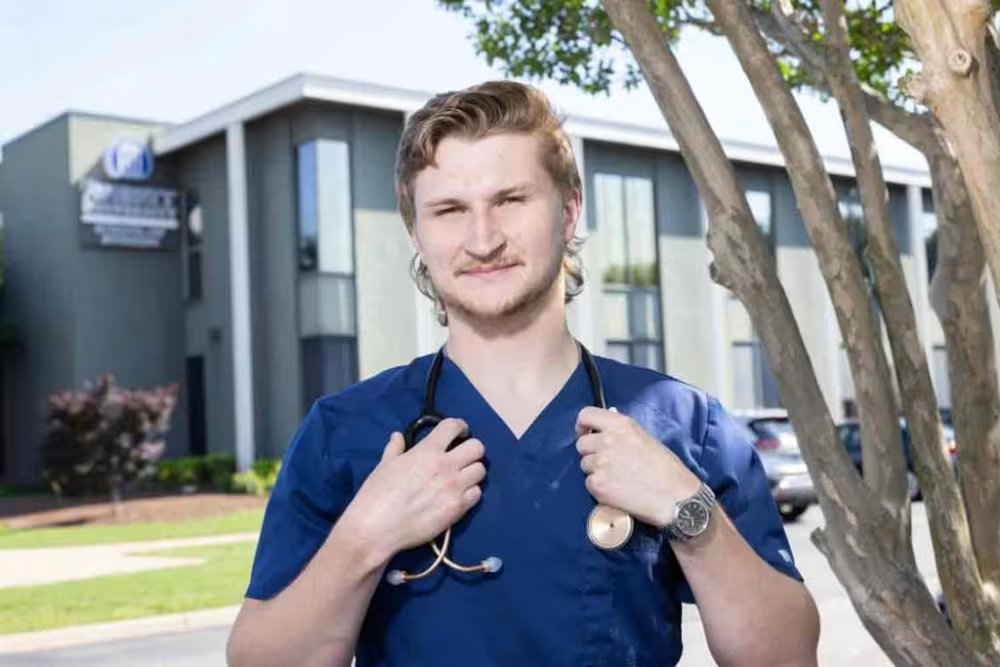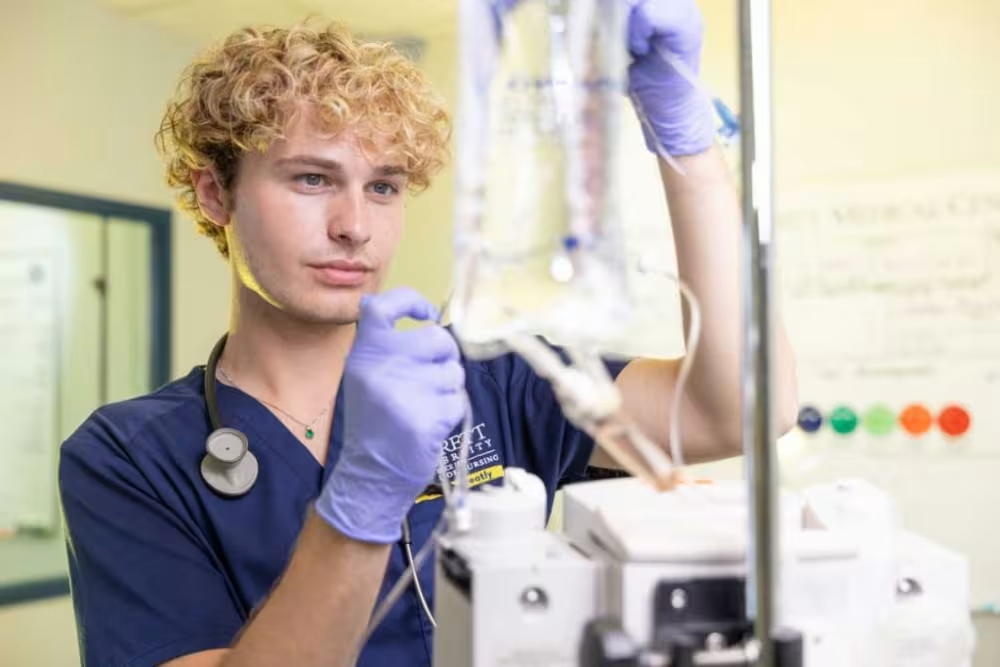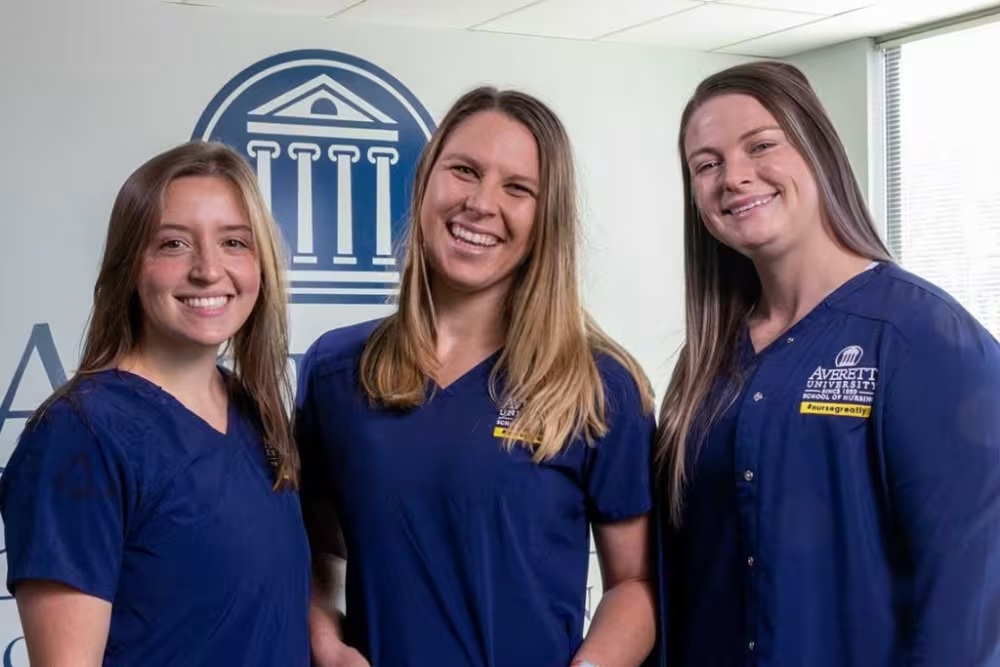What Is a Nurse Practitioner?
Each blog post is dated and contains accurate information as of that date. Certain information may have changed since the blog post publication date. If you would like to confirm the current accuracy of blog information, please visit our ABSN overview page or contact admissions at (866) 483-8705.
What is a nurse practitioner? A nurse practitioner is a type of advanced practice registered nurse, or APRN, who can practice with more autonomy and a broader scope of practice than a registered nurse. An NP needs graduate-level nursing education and APRN licensure.

If you’re interested in pursuing a career in nursing, you might appreciate the many opportunities for advancement. For example, a registered nurse (RN) could choose to advance to the role of nurse practitioner (NP).
What is a nurse practitioner, and what does a nurse practitioner do? An NP is a type of advanced clinician called an advanced practice registered nurse (APRN) who practices with more autonomy and a broader scope of practice than RNs. They can provide complex care, such as caring for patients with co-morbidities.
At Averett University, it’s our goal to help you build a foundation for a rewarding nursing career that’s full of potential for advancement. If you’d like to become a nurse practitioner, you’ll need to start by earning a Bachelor of Science in Nursing (BSN) degree.
Averett’s Accelerated Bachelor of Science in Nursing (ABSN) program can be your first step in your journey to becoming a nurse practitioner. Through the program, you can graduate with a Bachelor of Science in Nursing (BSN) in as few as 16 months.
What Does a Nurse Practitioner Do?
A nurse practitioner does everything an RN can do, including the following tasks:
- Administer medications and other treatments
- Assess patients, take their medical histories, and discuss their symptoms
- Care for wounds
- Develop and contribute to care plans
- Provide patient and family caregiver education

Because nurse practitioners complete graduate-level education and have advanced training, they practice with greater autonomy and a broader scope of practice than RNs. This means nurse practitioners can perform duties that other nurses cannot, including:
- Diagnosing patients
- Ordering lab tests
- Writing prescriptions (in accordance with prescribing authority laws in their state)
An NP can practice independently in many states. This means they can serve as a primary care provider without requiring the supervision of a physician. This scope of practice is crucial for addressing healthcare deserts, which are regions of the country where people don’t have full access to healthcare services.
In rural areas, where physician access is severely limited, nurse practitioners can bridge the gap and provide much-needed healthcare.
In addition, nurse practitioners can serve as leaders and nurse mentors within the workplace. They have a broader knowledge base, so other nurses look to them for insight. If leadership is one of your strengths, consider pursuing education beyond a BSN.
Difference Between Nurse Practitioners and Other Healthcare Providers
Compared to RNs, nurse practitioners have more practice authority. They can diagnose patients, prescribe medications in many states, and in general, take full responsibility for patient care.
What’s the difference between a nurse practitioner (NP) and a physician assistant (PA)? An NP is trained in advanced nursing and approaches patient care using the nursing model, in which they holistically treat patients by considering their physical, emotional, mental, and spiritual well-being.

Conversely, a PA is trained in the medical model, similar to medical doctors (MDs), which focuses on diagnosis and treatment.
Both require a graduate degree and board certification, and both can diagnose patients and prescribe medications. A nurse practitioner, however, has full practice authority in many states, whereas a PA works interdependently with a physician.
Both NPs and MDs can work in leadership roles and specialize in a particular area of medicine. While both practitioners have advanced education, MDs go to medical school, and NPs complete graduate-level nursing education and board certification.
Steps to Become a Nurse Practitioner
The job of any type of APRN is not an entry-level one. You’ll first need to earn a bachelor’s degree in nursing, obtain an RN license by passing the NCLEX, and gain clinical experience as an RN in your chosen specialty area.
You’ll then need to complete graduate-level nursing education and advanced clinical training and pass a board certification exam to obtain your NP license.
1. Earn Your BSN
Your journey toward becoming an NP begins with a Bachelor of Science in Nursing. During your bachelor's program, you will gain a fundamental knowledge base and begin applying it in a clinical setting.
If you have previous college credits or a non-nursing degree, consider the ABSN program at Averett University. As an ABSN student, you can receive a degree from a fully accredited BSN program in as few as 16 months.

This program is accelerated without compromising quality. It’s a rigorous curriculum that includes both didactic learning and hands-on experience.
The ABSN program first establishes a foundation in nursing theory and science through online coursework, where students can complete coursework on their own time through an e-learning platform; however, students must still meet deadlines.
They then apply this knowledge to nursing labs, where they practice core nursing skills and work through simulated clinical scenarios as a team. Lastly, students gain hands-on experience through clinical rotations, where they work in real healthcare facilities and provide direct patient care under supervision.
2. Pass the NCLEX and Gain Clinical Experience
Within a couple of months after graduating from Averett’s ABSN program, you’ll sit for the NCLEX-RN exam. This is the national licensure exam that all future nurses must pass.
It’s an adaptive test, meaning that the difficulty of the questions adjusts depending on your answers. Expect to be tested not only on your nursing knowledge but also on your ability to make clinical decisions in response to a patient case study.
Once you pass the NCLEX, you can obtain your state-issued RN license. Then, you can gain clinical experience in your specialty area. When choosing a specialty area, first consider the specialties available to NPs. They include:
- Adult-gerontology
- Family care
- Neonatal
- Pediatrics
- Psychiatric mental health
- Women’s health

Are you curious about your specialty options as an RN? Check out these 7 nursing specialties in demand.
3. Earn Your Graduate Degree in Nursing
After gaining at least a few years of clinical experience at the bedside, you may feel ready to pursue your graduate-level nursing education. Aspiring NPs can currently choose between a Master of Science in Nursing (MSN) or a Doctor of Nursing Practice (DNP). A DNP generally takes longer to complete and is more intensive.
Before choosing the MSN, however, be aware that the American Association of Colleges of Nursing (AACN) has proposed that the DNP be made the minimum education requirement for all NPs moving forward.
This is not an absolute requirement; it’s the responsibility of the state boards of nursing to establish the education requirements for APRNs in their states. Since the healthcare industry seems to be moving toward the DNP as the requirement, you might wish to err on the side of caution and earn a DNP. The DNP also includes substantial clinical training.

4. Pass the Board Certification Exam and Update Your Licensure
After completing your graduate-level education, you’ll need to pass a board certification for your chosen specialty area. Your board certification exam will be administered by either the American Nurses Credentialing Center (ANCC) or the American Academy of Nurse Practitioners Certification Board (AANPCB).
Upon passing the board certification exam, you’ll be eligible to apply for your APRN license from your state board of nursing.
5. Find a Job as an NP
NPs are highly sought after in the healthcare workforce. The U.S. Bureau of Labor Statistics (BLS) projects a 46% job growth rate for these clinicians from 2023 through 2033, much faster than average.
In addition, these APRNs earned a median annual salary of $129,210 as of May 2024. You have many options, from working in a hospital to opening an independent practice. Many states allow nurse practitioners to operate similarly to physicians.
Discover the differences between an Accelerated BSN vs. a traditional BSN.

Why Choose Averett?
Averett University’s ABSN program can allow you to earn your BSN in as few as 16 months. You’ll gain invaluable hands-on experience in labs and clinical rotations and benefit from online didactic coursework.
Work closely with an Academic Success Coach and enjoy personalized attention from instructors thanks to our small class sizes. You’ll graduate fully prepared to sit for the NCLEX, become an RN, and continue your journey toward becoming an advanced practice registered nurse.
Contact an admissions advisor at Averett today. You’ll receive one-on-one, personalized support as you navigate the admissions process.
